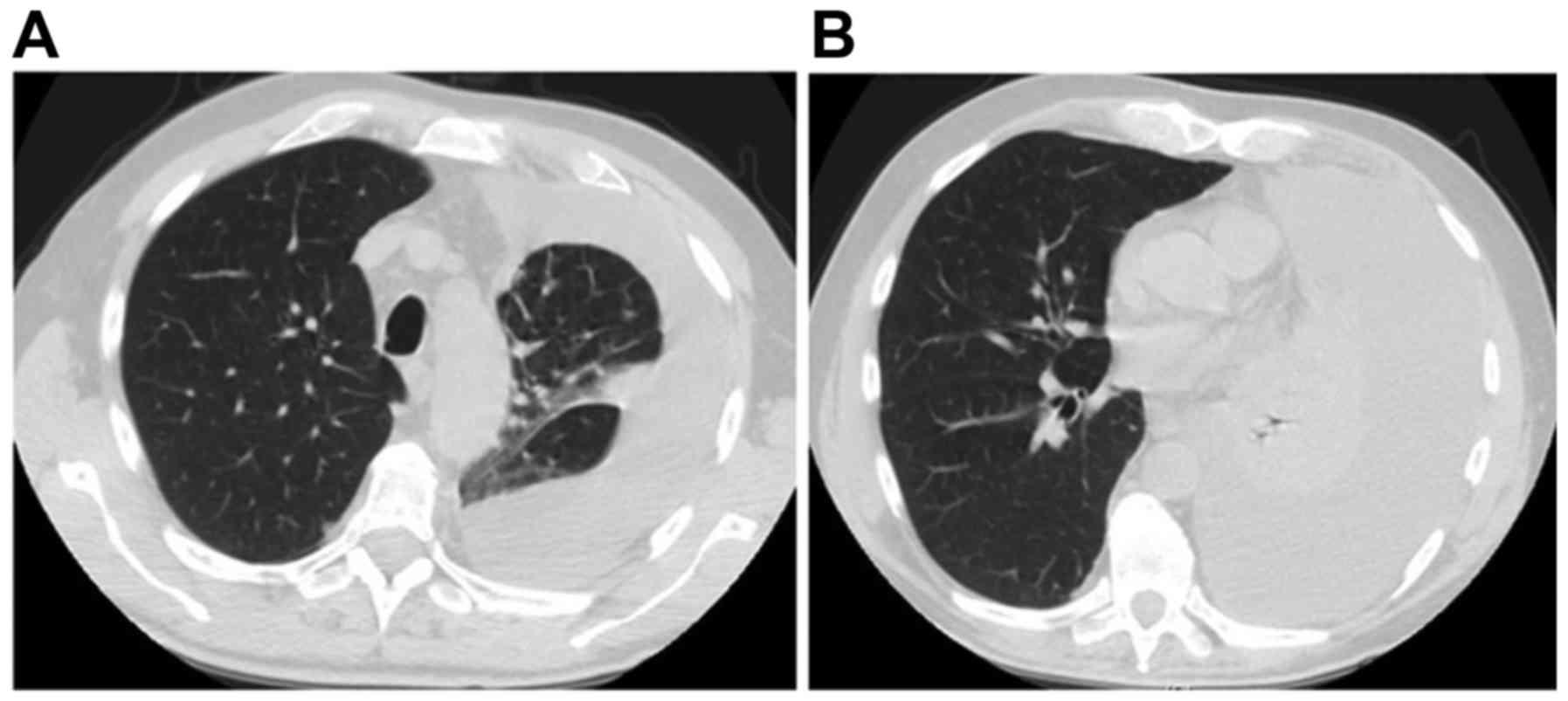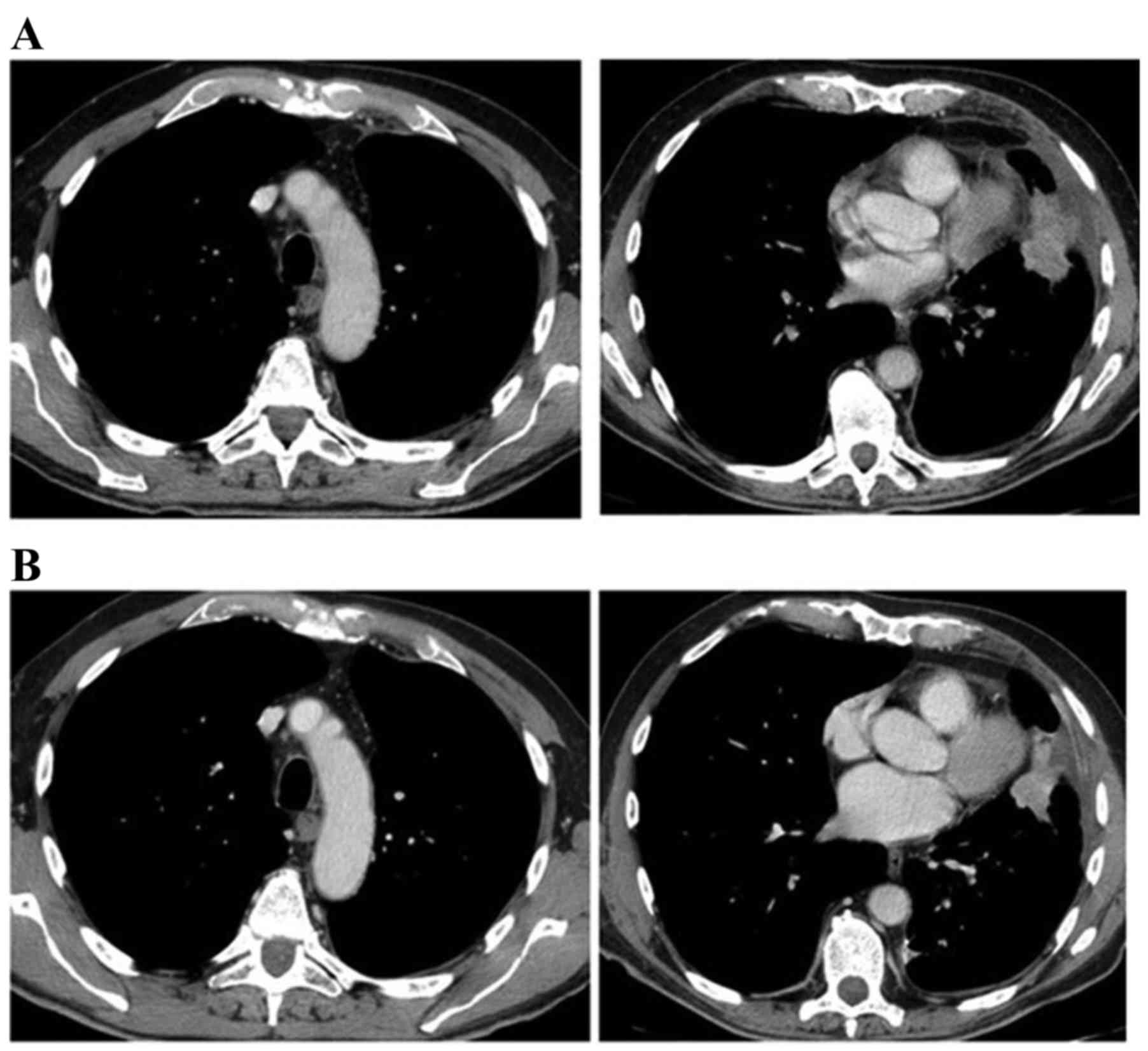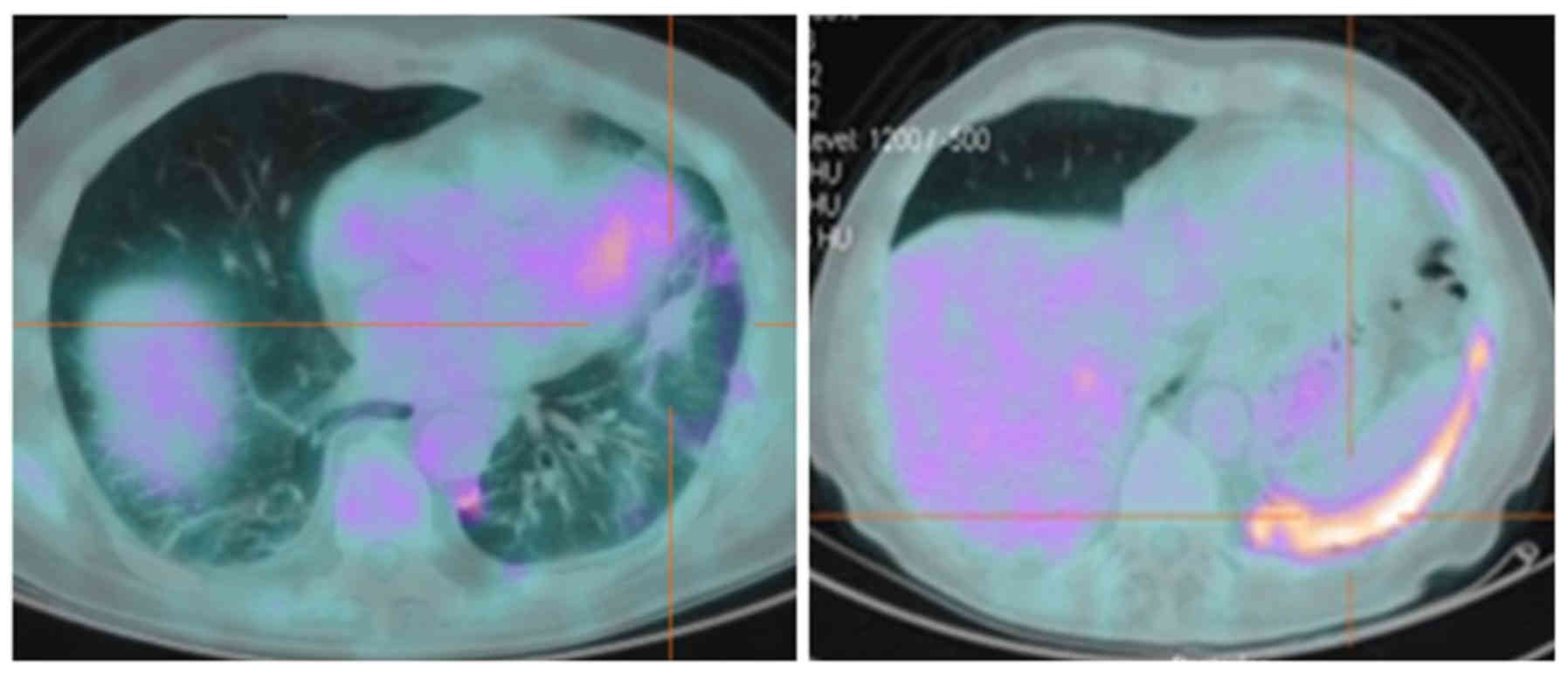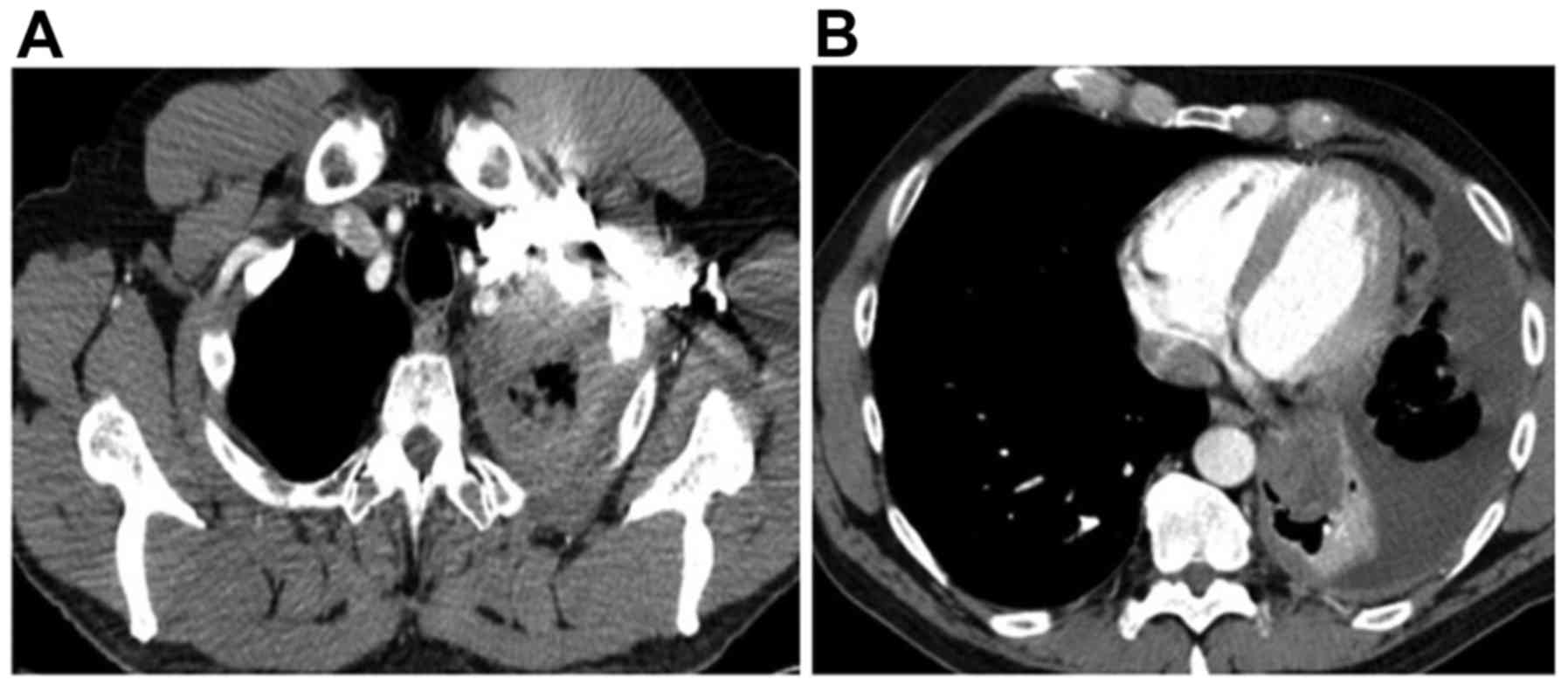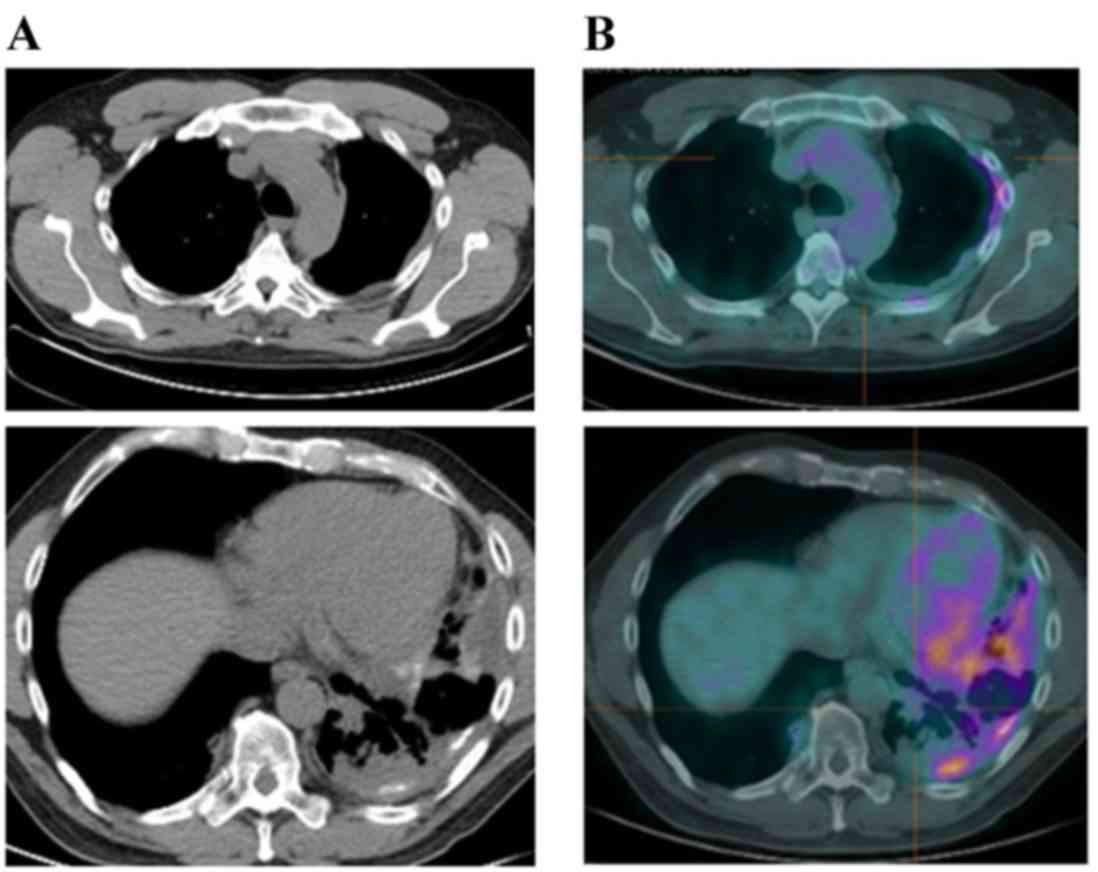|
1
|
Ettinger DS, Wood DE, Akerley W, Bazhenova
LA, Borghaei H, Camidge DR, Cheney RT, Chirieac LR, D'Amico TA,
Demmy TL, et al: NCCN guidelines insights: Non-Small cell lung
cancer, version 4.2016. J Natl Compr Canc Netw. 14:255–264. 2016.
View Article : Google Scholar : PubMed/NCBI
|
|
2
|
Molina JR, Yang P, Cassivi SD, Schild SE
and Adjei AA: Non-small cell lung cancer: Epidemiology, risk
factors, treatment, and survivorship. Mayo Clin Proc. 83:pp.
584–594. 2008; View Article : Google Scholar : PubMed/NCBI
|
|
3
|
Xiao HQ, Tian RH, Zhang ZH, Du KQ and Ni
YM: Efficacy of pemetrexed plus platinum doublet chemotherapy as
first-line treatment for advanced nonsquamous non-small-cell-lung
cancer: A systematic review and meta-analysis. Onco Targets Ther.
9:1471–1476. 2016.PubMed/NCBI
|
|
4
|
Paz-Ares LG, de Marinis F, Dediu M, Thomas
M, Pujol JL, Bidoli P, Molinier O, Sahoo TP, Laack E, Reck M, et
al: PARAMOUNT: Final overall survival results of the phase III
study of maintenance pemetrexed versus placebo immediately after
induction treatment with pemetrexed plus cisplatin for advanced
nonsquamous non-small-cell lung cancer. J Clin Oncol. 31:2895–2902.
2013. View Article : Google Scholar : PubMed/NCBI
|
|
5
|
Li G, Gao S, Sheng Z and Li B: The
efficacy of single-agent epidermal growth factor receptor tyrosine
kinase inhibitor therapy in biologically selected patients with
non-small-cell lung cancer: A meta-analysis of 19 randomized
controlled trials. Chemotherapy. 61:179–189. 2016. View Article : Google Scholar : PubMed/NCBI
|
|
6
|
Mitsudomi T, Morita S, Yatabe Y, Negoro S,
Okamoto I, Tsurutani J, Seto T, Satouchi M, Tada H, Hirashima T, et
al: Gefitinib versus cisplatin plus docetaxel in patients with
non-small-cell lung cancer harbouring mutations of the epidermal
growth factor receptor (WJTOG3405): An open label, randomised phase
3 trial. Lancet Oncol. 11:121–128. 2010. View Article : Google Scholar : PubMed/NCBI
|
|
7
|
Maemondo M, Inoue A, Kobayashi K, Sugawara
S, Oizumi S, Isobe H, Gemma A, Harada M, Yoshizawa H, Kinoshita I,
et al: Gefitinib or chemotherapy for non-small-cell lung cancer
with mutated EGFR. N Engl J Med. 362:2380–2388. 2010. View Article : Google Scholar : PubMed/NCBI
|
|
8
|
Paez JG, Jänne PA, Lee JC, Tracy S,
Greulich H, Gabriel S, Herman P, Kaye FJ, Lindeman N, Boggon TJ, et
al: EGFR mutations in lung cancer: Correlation with clinical
response to gefitinib therapy. Science. 304:1497–1500. 2004.
View Article : Google Scholar : PubMed/NCBI
|
|
9
|
Zhou C, Wu YL, Chen G, Feng J, Liu XQ,
Wang C, Zhang S, Wang J, Zhou S, Ren S, et al: Erlotinib versus
chemotherapy as first-line treatment for patients with advanced
EGFR mutation-positive non-small-cell lung cancer (OPTIMAL,
CTONG-0802): A multicentre, open-label, randomised, phase 3 study.
Lancet Oncol. 12:735–742. 2011. View Article : Google Scholar : PubMed/NCBI
|
|
10
|
Mok TS, Wu YL, Thongprasert S, Yang CH,
Chu DT, Saijo N, Sunpaweravong P, Han B, Margono B, Ichinose Y, et
al: Gefitinib or carboplatin-paclitaxel in pulmonary
adenocarcinoma. N Engl J Med. 361:947–957. 2009. View Article : Google Scholar : PubMed/NCBI
|
|
11
|
Yang JC, Sequist LV, Zhou C, Schuler M,
Geater SL, Mok T, Hu CP, Yamamoto N, Feng J, O'Byrne K, et al:
Effect of dose adjustment on the safety and efficacy of afatinib
for EGFR mutation-positive lung adenocarcinoma: Post hoc analyses
of the randomized LUX-Lung 3 and 6 trials. Ann Oncol. 27:2103–2110.
2016. View Article : Google Scholar : PubMed/NCBI
|
|
12
|
Zimmer PW, Hill M, Casey K, Harvey E and
Low DE: Prospective randomized trial of talc slurry vs bleomycin in
pleurodesis for syntomatic malignant pleural effusions. Chest.
112:430–434. 1997. View Article : Google Scholar : PubMed/NCBI
|
|
13
|
Cox SE and Katlic MR: Non-intubated
video-assisted thoracic surgery as the modality of choice for
treatment of recurrent pleural effusions. Ann Transl Med.
3:1032015.PubMed/NCBI
|
|
14
|
Rodriguez-Panadero F, Janssen JP and
Astoul P: Thoracoscopy: General overview and place in the diagnosis
and management of pleural effusion. Eur Resp J. 28:409–422. 2006.
View Article : Google Scholar
|
|
15
|
Xia H, Wang XJ, Zhou Q, Shi HZ and Tong
ZH: Efficacy and safety of talc pleurodesis for malignant pleural
effusion: A meta-analysis. PLoS One. 9:e870602014. View Article : Google Scholar : PubMed/NCBI
|
|
16
|
Rami-Porta R, Asamura H, Travis WD and
Rusch VW: Lung cancer-major changes in the American Joint Committee
on cancer eighth edition cancer staging manual. CA Cancer J Clin.
67:138–155. 2017. View Article : Google Scholar : PubMed/NCBI
|
|
17
|
Baker S, Dahele M, Lagerwaard F and Senan
S: A critical review of recent developments in radiotherapy for
non-small cell lung cancer. Radiat Oncol. 11:1152016. View Article : Google Scholar : PubMed/NCBI
|
|
18
|
Dupic G and Bellière-Calandry A: Non-small
cell lung cancer irradiation in elderly. Cancer Radiother.
20:322–329. 2016. View Article : Google Scholar : PubMed/NCBI
|
|
19
|
Eisenhauer EA, Therasse P, Bogaerts J,
Schwartz LH, Sargent D, Ford R, Dancey J, Arbuck S, Gwyther S,
Mooney M, et al: New response evaluation criteria in solid tumours:
Revised RECIST guideline (version 1.1). Eur J Cancer. 45:228–247.
2009. View Article : Google Scholar : PubMed/NCBI
|
|
20
|
Zappa C and Mousa SA: Non-small cell lung
cancer: Current treatment and future advances. Transl Lung Cancer
Res. 5:288–300. 2016. View Article : Google Scholar : PubMed/NCBI
|
|
21
|
Bearz A, Passalacqua R, Alabiso O, Cinieri
S, Gridelli C, Cravesana C and Crinò L: First-line
bevacizumab-based therapy in advanced non-squamous non-small-cell
lung cancer: Analysis of the Italian patients enrolled in the SAiL
study. Clin Drug Investig. 32:755–760. 2012. View Article : Google Scholar : PubMed/NCBI
|















